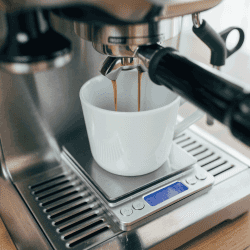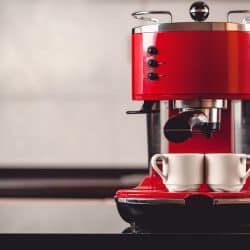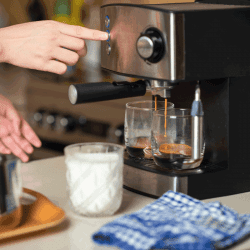Do you want to know if you should turn off an espresso machine? Well, we have researched this topic and have answers for you. It is essential to know if you should turn off an espresso machine to ensure your espresso machine has a long lifespan.
You should turn off an espresso machine when you a finished using it. Leaving an espresso machine on can wear out internal seals and electrical components, shortening its lifespan.
In this article, we will learn if you should turn off an espresso machine. We will also learn about other interesting related questions such as how long does it take for an espresso machine to heat up and how much electricity does an espresso machine use? Keep reading to learn more.
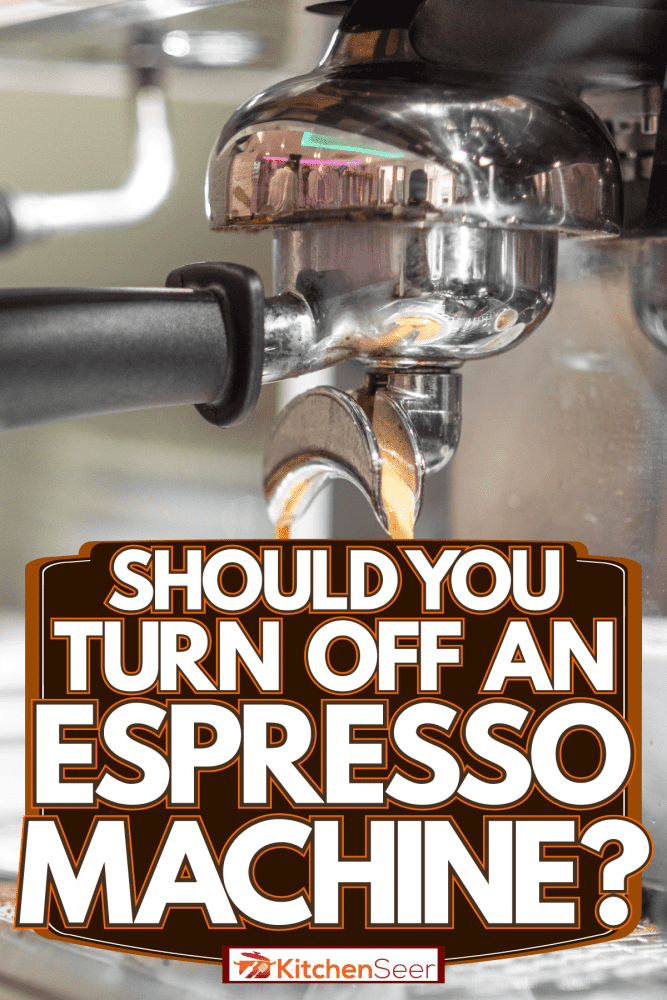
Should You Turn Off An Espresso Machine?
Many people love espresso but hate how expensive espresso machines can be. The high price of a good espresso machine has caused many to look for ways to extend the life of their espresso machine.
One of the most common ideas to extend the life of an espresso machine is to leave it on. The idea is that since the metal of the espresso machine expands and contracts every time it heats and cools, reducing the number of times it needs to heat up will extend its life.
While this idea works well for a light bulb, it doesn't apply here in the same way. Leaving your espresso machine on will not extend its lifespan. Leaving it on will shorten its lifespan considerably.
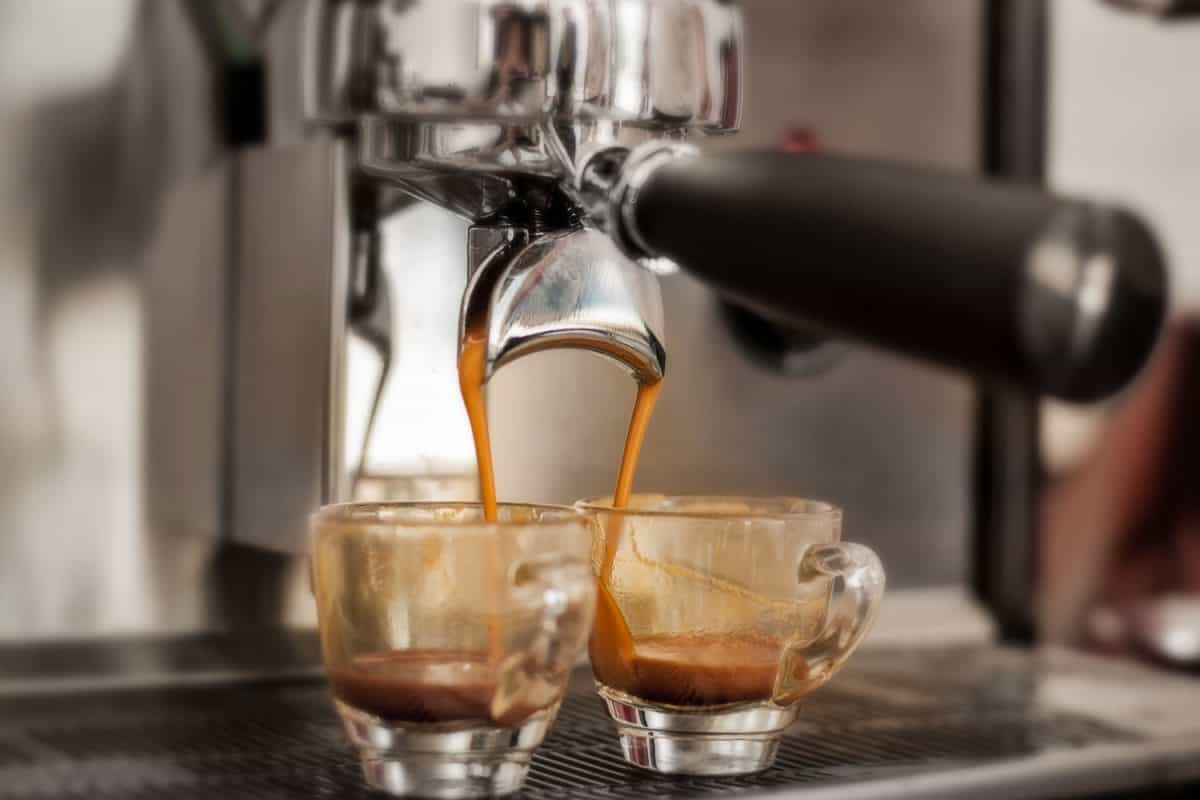
The metal in an espresso machine doesn't expand and contract enough to have any considerable amount of damage over time. There are, however, components in an espresso machine that do not like to be exposed to continuous heat. Next, we will tell you what could happen to these components if you leave your espresso machine on.
What Happens If You Leave An Espresso Machine On?
The components of an espresso machine that can be damaged by exposure to continuous heat include rubber gaskets and electrical components. We will cover what can happen to each with too much heat exposure.
Rubber Gaskets
When rubber gaskets are heated, they begin to warp slightly. Once you turn off your espresso machine, the rubber gaskets return to their original shape. Over time the gaskets will have a more challenging time returning to their original shape until one day they fail.
When your espresso machine is left on, the rubber gaskets warp much more than usual, and this makes it even harder for the gaskets to return to their original shape. This excessive heat dramatically shortens the life span of your espresso machine's gaskets.
Electrical Components
Electrical components prefer cold temperatures. When an electrical part experiences too much heat, it increases the likelihood of it failing. The typical heating duration of an espresso machine is enough for electrical components to handle for years; however, leaving your device on can significantly shorten the lifespan of these components.
Leaving Your Espresso Machine On
As you can see, you should not leave your espresso machine on. Doing so will not extend its lifespan and will shorten it. We will now discuss how long it takes for an espresso machine to heat up.
How Long Does It Take For An Espresso Machine To Heat Up?
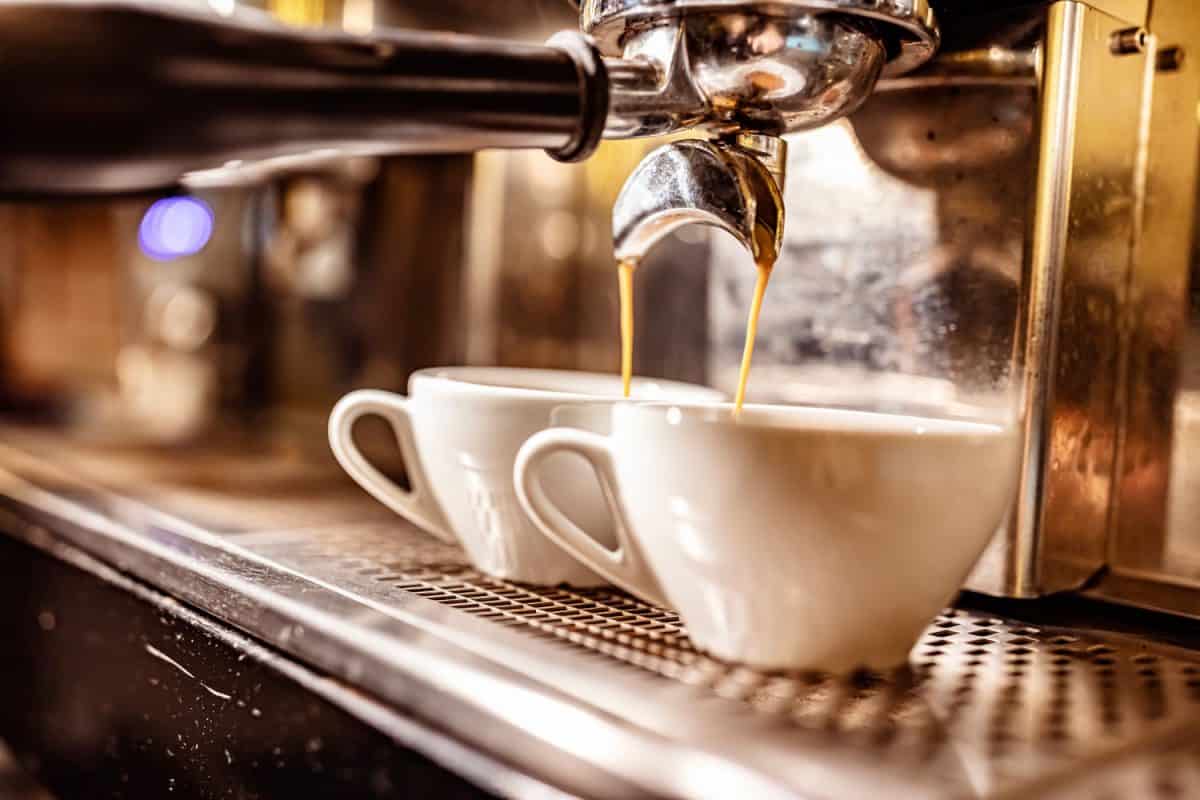
There are two reasons that someone may leave their espresso machine on. The first reason is to increase the espresso machine's lifespan, and we just learned that this is ineffective.
The second reason people leave their espresso machines on is so they don't have to wait for their device to heat up to enjoy espresso. Let's first discuss how long it takes for your espresso machine to heat up and alternatives to leaving your espresso machine on so you can enjoy your espresso without having to wait.
When you turn on your espresso machine, it can take up to 35 minutes to be fully heated. This can often be too long when waiting in the morning for espresso. While you can technically make espresso after 20min, to ensure the best-flavored espresso, you should wait the full 35 minutes.
There is a solution to ensure you never have to wait for your espresso machine to heat up to have hot ready espresso. The answer is an electric timer.
An electric timer is a device that you plug directly into your outlet and allows you to choose when you want your espresso machine to turn on. With this device, you can have your espresso machine preheated and waiting for you every morning before work.
You can also set your electric timer to turn off after making your espresso automatically.
Now that we know how long it takes for an espresso machine to heat up and a solution to ensure it is always preheated for you, let's discuss how much electricity an espresso machine uses.
How Much Electricity Does An Espresso Machine Use?
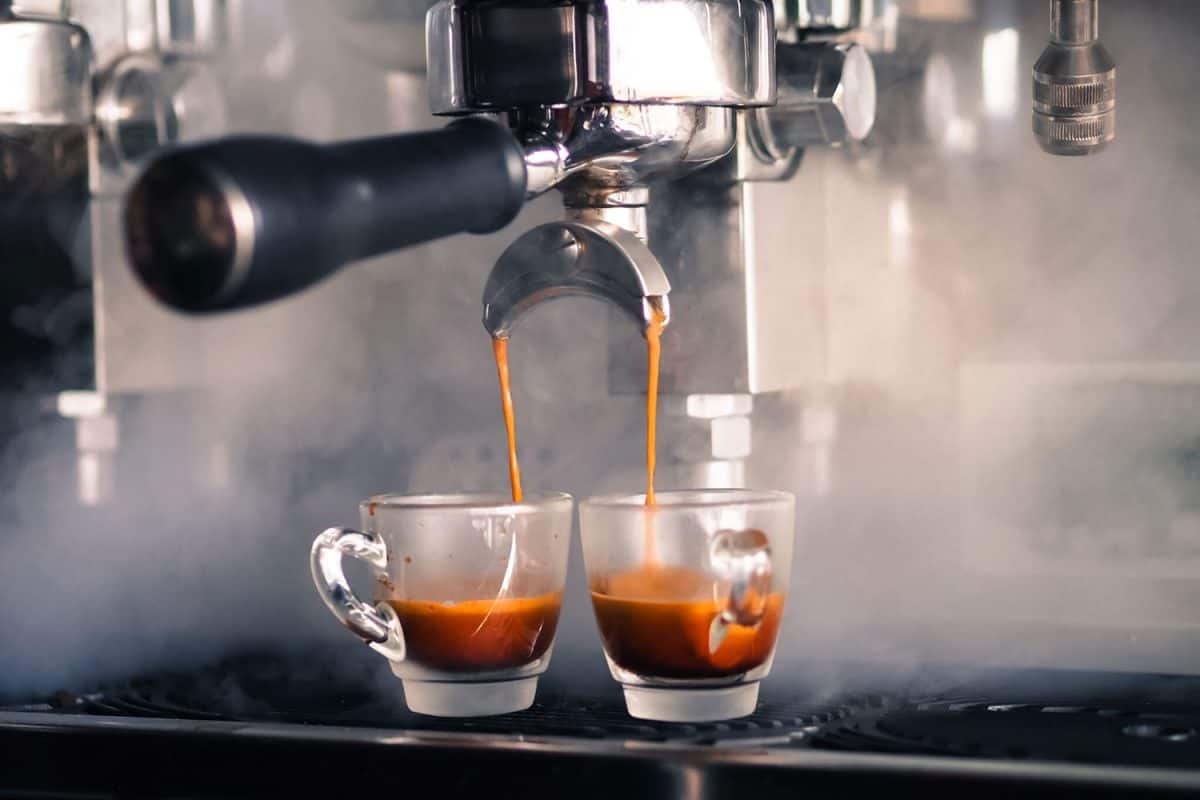
An espresso machine takes between 1000 and 1500 watts to run. This means that to produce a single cup of espresso, assuming it takes a little under a min to make, it takes about 1-1.5kW.
To give you an idea of how much electricity this is, here is a list of some other things that take 1kW of electricity to do.
With 1kW of power, you can blend 200 smoothies, toast 160 slices of bread, watch 6 hours of an LCD TV, or microwave 21 frozen burritos.
As you can see, an espresso machine uses a lot of power. The price you pay for electricity to make a cup of espresso is about 12 cents. While this isn't that much, over a year, making one cup of espresso a day can add up to nearly 44 dollars.
How Do You Turn Off An Espresso Machine?
Depending on which espresso machine you are using, there will be different ways to turn it off. While some espresso machines have an on-off button, others do not.
Some espresso machines have a brew button that you have to hold down for a few seconds to power off the device. Other espresso machines have a switch in the back that powers on and off the machine.
It is essential for the lifespan of your espresso machine that you turn it off when not in use. Be sure to read your owner's manual or look for information online if you have trouble finding your specific machines off button.
You can also use an electric timer to ensure that your espresso machine powers off at a particular time. This will remove the need to turn off your espresso machine as, once the proper time is reached, power to the machine will be shut off.
Now that we know about the many ways to turn off an espresso machine and where you can find how to turn off yours, we will learn how long you can leave water in an espresso machine.
How Long Can You Leave Water In An Espresso Machine?
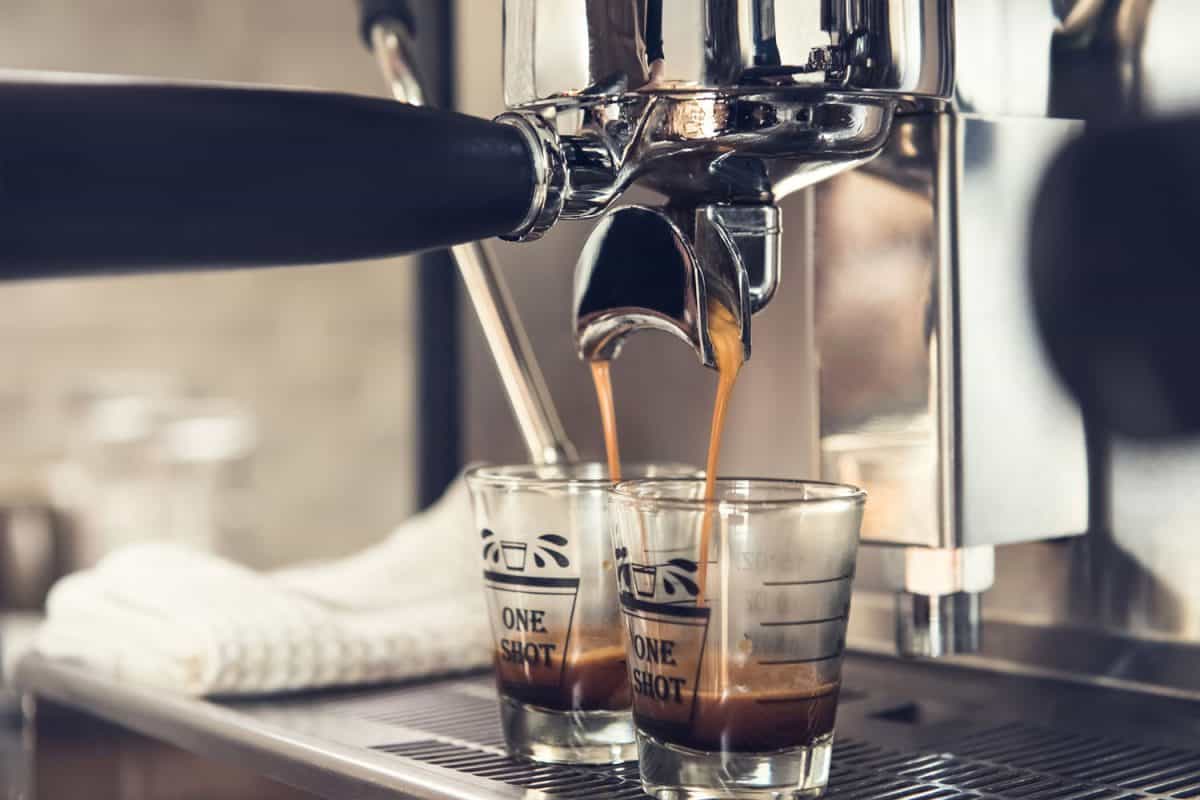
One drawback to owning an espresso machine is having to change the water. Many procrastinate on this task as long as possible to avoid the hassle. This may have you wondering how long can you leave water in your espresso machine before it's unsafe.
You should change the water inside your espresso machine at least every 48 hours to ensure your safety. It isn't safe to leave water in your espresso machine any longer than this because of microorganisms.
Microorganisms are everywhere around us. They are in the air we breathe and the water we drink. The issue with leaving water in your espresso machine longer than 48 hours is that it gives the microorganisms in the water time to reproduce to dangerous levels.
If you have ever drunk water that had been sitting and it tasted stale, it is because of these microorganisms. To best keep your water safe to drink, clean out the water reservoir and replace the water in your espresso machine every 48 hours.
Some espresso machines can boil the water in their water reservoir. This boiling will kill all the microorganisms and make the water safe to drink.
The water may still taste stale if you don't change it every 48 hours. Boiling the water makes it safe to drink; it doesn't remove the stale taste.
Final Thoughts
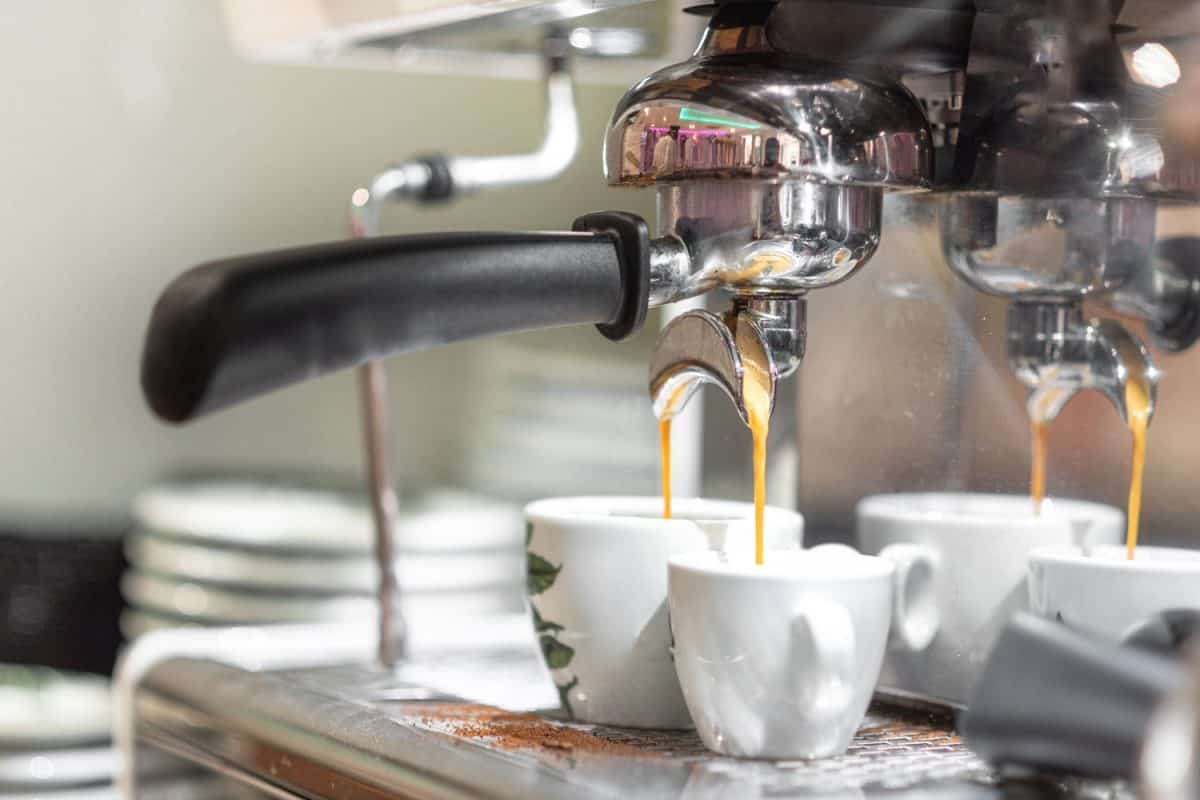
In this article, we learned that you should turn off an espresso machine when you are done using it to increase its lifespan. We also learned that your espresso machine takes about 35 minutes to heat up enough to make a good cup of espresso, but that you can use an electric timer to ensure it is preheated when you need it.
It is also crucial to change the water in your espresso machine every 48 hours for your safety and a good-tasting cup of espresso.
We hope you enjoyed this article. If you want to learn more, check out some of these other posts.
What Kind Of Coffee To Use For Espresso Machine
How Often Should You Descale An Espresso Machine?


